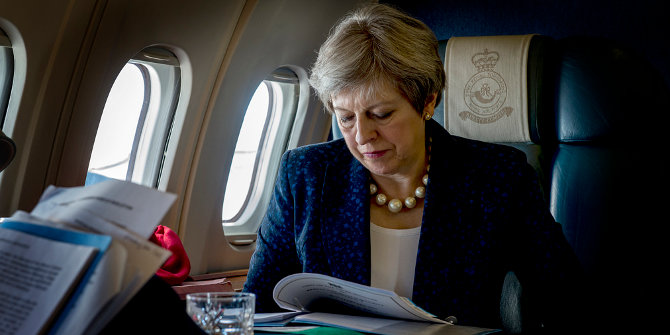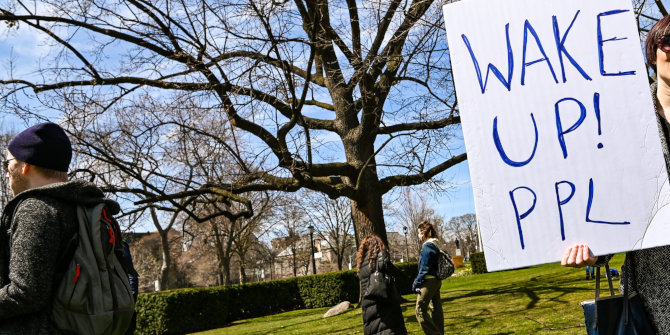 Studies on the growth of Muslim populations in western Europe often focus on the role of immigration, but every year an increasing number of citizens in western European countries also make the decision to convert to Islam. Esra Özyürek writes on the challenges faced by German converts, noting that Germany’s Muslim communities have adopted a variety of different approaches aimed at integrating into German society without giving up their religious beliefs.
Studies on the growth of Muslim populations in western Europe often focus on the role of immigration, but every year an increasing number of citizens in western European countries also make the decision to convert to Islam. Esra Özyürek writes on the challenges faced by German converts, noting that Germany’s Muslim communities have adopted a variety of different approaches aimed at integrating into German society without giving up their religious beliefs.
It is estimated that there are around 100,000 converts to Islam in Germany. The number is comparable to that in France and the United Kingdom. And similarly there are increasing number of converts in all West European countries, as well as the United States. Needless to say, these are also countries where there is increasing fear and hatred of Islam. Hence, conversion to Islam in this context generates curiosity from an outsider perspective and many challenges for those who embrace Islam in a society that increasingly marginalises and racialises Muslims.
At the same time German Muslims accommodate Islam to German identity and carve out legitimate space for Germans in the Ummah, the global community of Muslims. In other words, conversion to Islam has socially transformative consequences despite the seemingly individualistic and politically unmotivated acts of converts for the German society and Muslim community.
How have today’s German converts come to terms with their admiration for Islam alongside the widespread marginalisation of Muslims? How and why can one love Islam, yet find it so difficult to love immigrant Muslims or their Islamic practices? What does it mean to be a “white” Muslim when Islam is increasingly racialised? How do German Muslims relate to immigrant Muslims once they convert? How do previously Christian or atheist German Muslims shape debates about the relationship between race, religion, and belonging in Germany?
Being German, Becoming Muslim
These questions form the focus of my book, Being German, Becoming Muslim. By assessing the experiences of indigenous Europeans who have embraced a religion that is seen as external to Europe, I also attempt to understand the complex set of prejudices and exclusionary practices that are called Islamophobia. The reactions of both mainstream German society and born Muslims to converted Muslims, and the latter’s responses to born Muslims, shed light on the intersection of biological with cultural racism.

Muslim identity is something that is scripted on the bodies of immigrant Muslims, but Islam can also be chosen by indigenous Europeans. Can we call converted Muslim criticism of born Muslims and their traditions Islamophobia? What are we to make of the abhorrence that converted Muslims generate in mainstream society? Or to put it another way, where do belief and individual choice fit in the racialised and religiously defined exclusion of Muslims in Europe?
These issues exist in the context of social and political developments that shape German society at large, and it is also important to pay attention to the political consequences of conversions. The arrival of millions of Muslim workers to rebuild the war-torn country was one of the most significant post–World War II developments. It transformed, and continues to transform, Germany. These workers and their families brought an unexpected challenge to the mostly homogeneous post-Holocaust German society, and forced it to come to terms with difference again.
One result of this development was the construction of racial dichotomies between Turks and Germans as well as between Muslims and Christians/Europeans/secular subjects. Another related, perhaps inevitable outcome was cultural interpenetration and boundary crossing between these dichotomies. Hundreds of thousands of Muslim immigrants and their children took citizenship after changes in the German citizenship law in 2000, while a small but increasing number of formerly Christian or atheist Germans converted to Islam. Such border crossings have a profound effect on transforming these categories because they challenge how we define Germans and Muslims.
Mainstream society marginalises German converts to Islam, and questions their Germanness and Europeanness, based on the belief that one cannot be a German or European and a Muslim at the same time. Converts to Islam are accused of being traitors to European culture, internal enemies that need to be watched, and potential terrorists. Having become new Muslims in a context where Islam is seen as everything that is not European, ethnic German converts disassociate themselves from Muslim migrants, and promote a supposedly denationalised and de-traditionalised Islam that is not tainted by migrant Muslims and their national traditions, but instead goes beyond them.
Some German Muslims along with some other European-born ethnic Muslims promote the idea that once cleansed of these oppressive accretions, the pure Islam that is revealed fits in perfectly well with German values and lifestyles. Some even argue that practicing Islam in Germany builds on the older but now-lost values of the German Enlightenment, including curiosity about and tolerance of difference. For East German Muslims who converted after the fall of the Berlin Wall, becoming Muslim was a way of escaping their East German identity.
Born Muslims who grew up in Germany increasingly adopt these discourses and promote de-culturalisation of Islam as a way for Muslims to integrate into German society without giving up their religious beliefs. At the same time, a newer and even more popular trend of Islamic conversion bypasses the questions of national tradition and identity altogether by ostensibly going back to the earliest roots of Islam, with converts isolating themselves not only from non-Muslim society but also from other Muslims.
Please read our comments policy before commenting.
Note: This article gives the views of the author, and not the position of EUROPP – European Politics and Policy, nor of the London School of Economics.
Shortened URL for this post: http://bit.ly/1Ddw8Ff
_________________________________
 Esra Özyürek – LSE
Esra Özyürek – LSE
Esra Özyürek is Associate Professor in Contemporary Turkish Studies at LSE’s European Institute.





